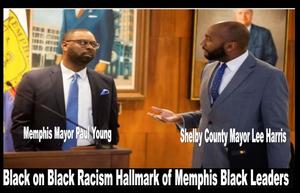
2023, U.S. Census data revealed that Memphis, Tennessee is the largest majority-Black city in the United States, Most poorest, Uneducated whose leaders have an aversion to "Black Memphis History" or a Black Memphis History Museum
MEMPHIS, TN, April 22, 2025 /24-7PressRelease/ -- To the world! Anyone who reads this story this news release is an S.O.S. against Memphis White Supremacy, Racism and Black on Black Racism." Anthony "Amp" Elmore Memphis curator of "Black Memphis History" prays that search engines will pick up on the key word "Black on Black Racism" and hold Memphis Black elected officials accountable.
Anthony "Amp" Elmore a Memphis born 5 time World Karate/Kickboxing Champion notes: while Memphis is known for the Blues we created a space for Black America and the World whereas from the Black Memphis Community of "Orange Mound" we created "The 1st Kickboxing Film in World Film History" in 1988 titled "The Contemporary Gladiator."
Despite its groundbreaking significance in promoting diversity and inclusion, the film has been racially extricated from world history via Memphis White Supremacy, Racism and Black on Black Racism. Elmore explains when I was a little Kid growing up I admired and loved Bruce Lee and oriental martial arts masters and teachers. I followed Martial arts teachers into Buddhism and Karate and would become a 5 time World champion whose prayer was to make a difference in world.
Today Elmore is fighting Memphis White Supremacy, Racism and Black on Black Racism where both Black and White leaders used their function and authority to erase our film history via our making the 1st Kickboxing film in world film history.
Elmore notes today in Memphis its Black leaders who are complicit to "Black on Black racism" and erasing our Black Film history out of the lives of Black America.
Dr. Martin Luther Kings said: "There comes a time when silence is betrayal." "Our lives begin to end the day we become silent about things that matter." "In the end, we will remember not the words of our enemies, but the silence of our friends."
On April 4, 1968 when Dr. Martin Luther King Jr. was brutally assassinated in Memphis on the balcony of the Lorraine Motel in Memphis. Unknown and untold Memphis adds insult to injury whereas Memphis Black leaders practice "Black on Black Racism" and are silent regarding Memphis outright pimping the death of Dr. Martin Luther King Jr. as a major Memphis "Tourist Attraction." The culture and practice in Memphis is not portrayed as to how Dr. King lived, Memphis culture and history celebrates how Dr. King died.
Elmore ask readers to: click here to see a 2 ½ minute video titled: Robbing Black Memphis Film History Invasion of The Body Snatchers.
Anthony "Amp" Elmore draws a striking parallel between the erasure of his Black Memphis film history and the chilling narrative of the 1956 science fiction classic Invasion of the Body Snatchers. Just as the film depicts a sinister force replacing individuals with emotionless replicas, there exist in Memphis a sinister force of Black on Black racism whereas many Black elected Memphis leaders have replaced White Supremacist with emotionless Black leaders who discriminate against "Black Memphis History."
Elmore argues that the City of Memphis, through both Black and White leadership, has systematically erased his groundbreaking contributions to Memphis history, culture, art and independent filmmaking.
In 1987, Elmore began production on "The Contemporary Gladiator", the first independent 35mm theatrical film created in Memphis film history. Despite clear evidence, including documentation from the L.A. Times noting that the film's production began in 1987 and its release occurred in August 1988, Memphis White Shelby County Film Commissioner Linn Sitler used her function and authority to obscure not only Elmore's historic achievement, Linn Sitler has used her White authority to shape the history and culture of Memphis.
Click here to see the "You Tube Video" titled: Ms. Ann White Woman Shaped Memphis Culture History and Art. Elmore notes it is incredulous that in 2025 an old White Woman continues to shape Memphis art and culture.
On April 18, 2025, Ryan Coogler's film Sinners premiered, earning a remarkable $61 million globally in its opening weekend—$45.6 million domestically and $15.4 million internationally—making it the biggest debut for an original film since 2019 and setting a record for horror films on IMAX. More than a box office triumph, Sinners told the powerful story of Clarksdale, Mississippi, capturing the essence of the Blues and Black culture while portraying a Black character's victory over the KKK.
This starkly contrasts with Memphis, Tennessee, where systemic racism, white supremacy, and "Black on Black Racism" have stifled opportunities for Black filmmakers. While Coogler's film celebrates Black history and heroes that resonate with audiences, Memphis continues to nurture an environment where only white-funded films thrive. For over two decades, Memphis has failed to produce significant films, a direct result of a system dominated by figures like Film Commissioner Linn Sitler, who prioritizes white filmmakers and marginalizes Black talent, denying Memphis the chance to tell its own rich and diverse stories. This disparity underscores the hostile climate that prevents Memphis from nurturing films like Sinners, leaving a cultural void for Black filmmakers and audiences in the city.
In 2007 the Memphis Shelby County Film Commission and the Shelby County Historical Commission installed a historical marker at G.E. Patterson and Main Street falsely credits the 1989 film Mystery Train as Memphis's first independent 35mm film.
This deliberate misrepresentation, supported by both Black and White Memphis leaders, highlights what Elmore identifies as a dual struggle against White supremacy and Black on Black racism.
The Internet Movie Database (IMDb) is an online database of information related to films, television series, podcasts, home videos, video games, and streaming content online – including cast, production crew and personal biographies, plot summaries, trivia, ratings, and fan and critical reviews.
The discrepancy is undeniable—IMDb lists The Contemporary Gladiator as a 1988 release, predating "Mystery Train". Yet, Elmore finds himself fighting not only for his personal legacy but for the broader heritage of Black America. As the father of independent filmmaking in Memphis and the creator of the world's first kickboxing film, Elmore's contributions represent a "Heritage asset" that belongs to Black America. His battle underscores the urgent need to confront systemic racism in all its forms and to reclaim the narrative of Black excellence in Memphis.
The struggle of Anthony "Amp" Elmore to gain recognition for his film "The Contemporary Gladiator" is more than a personal quest; it's a searing expose on the systemic marginalization of Black heritage within Memphis. This erasure, often fueled by Black-on-Black racism in Memphis. This erasure serves to suppress achievements that could redefine the city's historical narrative and challenge its entrenched power structures.
"The Contemporary Gladiator" isn't just a film; it's a "Black Heritage Asset" of immense cultural and historical value. As the first independent 35mm theatrical film produced in Memphis, and the first kickboxing film in world cinema, it represents a groundbreaking achievement that should be celebrated worldwide and no longer racially buried in exclusion.
Elmore's role as writer, producer, director, editor, and soundtrack contributor, coupled with the film's production in the historically Black neighborhood of Orange Mound, using an early all-Black crew from Chicago, adds layers of significance to this cultural artifact. In 1987, Elmore took the bold step of hiring an all-Black film crew from Chicago, who lived in his home, transforming it into a makeshift "Hollywood Film Set." This was more than a production; it was a cultural phenomenon. Legendary Black photographer the late Onikwa Bill Wallace, from the Chicago Defender served as Elmore's original Director of Photography, further solidifying the film's place in Black history.
This unique production environment fostered a space for Elmore to learn filmmaking, particularly how to film Black subjects, outside the conventions of traditional, often racist film looks. Elmore learned that techniques like shining oil on dark skin, common in older films, were rooted in racist practices. The experience was transformative, providing Elmore with a cinematic education and a deeper understanding of the challenges and triumphs of Black filmmaking.
Despite these achievements, Elmore faced obstacles that reeked of racial bias. Linn Sitler, the Memphis Shelby County Film Commissioner, whose role should have been to support and promote local filmmaking, never visited the set and was conspicuously absent from the film's premiere. This was not a mere oversight, but a glaring indication of the systemic disregard for Black artistic endeavors within the city's official structures. The film received a dismissive review from Commercial Appeal Film Critic Labadie, a critique that seemed to disregard the film's groundbreaking status and the fact that it was the first of its kind in not just Memphis it's the 1st Kickboxing film in world film history. This Memphis racist critique echoed a long history of minimizing and dismissing Black artistic achievements.
Even today, in a city with significant Black leadership – two Black mayors, a majority-Black City Council and Shelby County Commission, and a majority-Black Shelby County School Board – Elmore's film remains largely unacknowledged. This ongoing neglect, driven by white supremacy and Black-on-Black racism, denies Elmore and Black Memphis its rightful place in history and deprives Black America of a vital cultural touchstone.
The failure to recognize this film as a historical asset, worthy of inclusion in the United States Congressional Film Registry, is a stark reminder of how deeply embedded systemic racism is, even within the Black community itself. Elmore's continued struggle highlights how white supremacist structures can operate even when Black individuals hold positions of power, leading to the perpetuation of discriminatory practices and the marginalization of Black achievements.
Elmore's battle is a testament to the power of film as a cultural force and the ongoing struggle for recognition in a system that often seeks to erase Black achievement. His film stands as a powerful symbol of Black creativity, resilience, and self-determination, and its continued suppression is a disservice to the city of Memphis and to the nation. The city's refusal to acknowledge Elmore's contribution speaks volumes about the deep-seated issues of race, power, and historical memory that continue to plague American society.
Click here to see the new released Elmore video titled: Black on Black Racism: Memphis Discriminates Against Black History & Black Filmmakers
Memphis is the most populated city of Blacks in America not only lacks a "Black Memphis History Museum" the video shows how Memphis discriminates against Black History, Black Films and Black Filmmakers. Memphis has a "Cotton Museum" and Memphis specifically does not have a "Black Memphis History Museum."
Anthony "Amp" Elmore has boldly criticized the City of Memphis for what he describes as "pimping the Dr. King legacy," a term he uses to highlight the city's exploitation of Dr. Martin Luther King Jr.'s assassination for economic gain for Whites while neglecting the deeper issues of racial inequality and poverty that King fought to address. Memphis, where Dr. King was tragically assassinated in 1968, has become a paradoxical symbol of his legacy. While the city profits from tourism centered on the Lorraine Motel, now the National Civil Rights Museum, it remains one of the poorest and most uneducated metro areas in the United States.
This stark reality underscores the systemic failures that continue to plague Memphis, where more than one-third of Black residents live below the poverty line, and educational attainment lags behind other metropolitan areas.
Elmore argues that the city's leadership, both Black and White, has failed to honor King's vision of equality and justice. Instead of addressing the root causes of poverty and systemic racism, Memphis has commodified King's death, turning it into a profitable enterprise while ignoring the broader narrative of "Black Memphis history." This exploitation, Elmore contends, is a betrayal of King's legacy and a disservice to the city's Black community, which continues to struggle under the weight of economic and social disparities.
Anthony "Amp" Elmore: A Legacy of Resilience Amid Racism and Erasure in Memphis Film History
Anthony "Amp" Elmore's journey as a Black filmmaker is a testament to resilience in the face of systemic racism, white supremacy, and what he identifies as "Black on Black Racism" among Memphis leadership. Despite groundbreaking achievements, Elmore's contributions to Memphis's cultural and cinematic history have been systematically excluded, highlighting the pervasive inequities within the city's institutions.
In 1987, Elmore made history with The Contemporary Gladiator, the first independent 35mm theatrical film produced in Memphis. This milestone was documented in the Los Angeles Times on November 22, 1987, under the headline "Films Going into Production: The Contemporary Gladiator." Yet, the Memphis Shelby County Music, Film, and Tape Commission failed to acknowledge this historic production—a glaring omission that Elmore attributes to entrenched racial disparities and institutional neglect.
The exclusion of The Contemporary Gladiator extended into the 2019 Memphis Bicentennial Celebration, where the event's "Salute to Made in Memphis Cinema" failed to include Elmore's film. Despite its undeniable significance, the film was omitted from official recognition, reflecting a broader pattern of erasure. Shelby County Mayor Lee Harris, who was involved in the Bicentennial Celebration, remained silent on the issue, offering no advocacy for inclusion. This silence, Elmore argues, exemplifies complicity in systemic racism and the perpetuation of "Black on Black Racism" by African American leaders in positions of power.
Refusing to be silenced, Elmore took matters into his own hands. On May 22, 2019, he premiered his film 200 Years of Black Memphis History at the Malco Majestic Theatre, creating Memphis's first documented chronicle of Black history through cinema. Simultaneously, Elmore released the film on YouTube, ensuring its accessibility and preserving its significance despite institutional barriers. His efforts underscore the resilience required to challenge systemic exclusion and celebrate Black contributions to Memphis's cultural legacy.
From 1987 to today, Elmore has continued to produce films, only to face ongoing exclusion from Memphis's film institutions. He asserts that Memphis Shelby County Film Commissioner Linn Sitler, in concert with African American officials, has actively worked to erase his film history. In response, Elmore launched the website "BlackMemphisHistory.com," a digital archive dedicated to preserving and amplifying Black narratives in Memphis. Through this platform and the production of hundreds of short films, Elmore is reclaiming the history that institutions have sought to deny.
In April 2024, during Memphis Mayor Paul Young's "One Memphis Tour," Elmore directly appealed for action to end discriminatory practices within the city's film institutions.
Click here to see His YouTube video, titled Black Memphis History Filmmaker Elmore Requests Memphis Mayor Young to Stop Film Commission's Racism, outlines the systemic racism and erasure perpetuated by Memphis leadership, including Mayor Young. Despite these efforts, Elmore contends that the systemic issues remain unaddressed.
Elmore's story is not just a personal fight—it is a call to action against the systemic barriers that continue to marginalize Black creators in Memphis. His work serves as a powerful reminder of the importance of documenting and amplifying underrepresented voices, ensuring that Black Memphis history and contributions are celebrated and preserved for generations to come.
To combat the pervasive issues of white supremacy, racism, and what he identifies as "Black on Black Racism" in Memphis, Click here to Anthony "Amp" Elmore launched the Orange Mound News Network (OMNN). Founded with a mission to reclaim and reshape the narrative of Orange Mound, OMNN leverages the power of filmmaking, education, and content creation to challenge the deeply ingrained stereotypes and biased portrayals that have long plagued Black Memphis and the Orange Mound community. Elmore envisions OMNN as a platform that fosters a positive space for celebrating Black culture, history, family, and education—elements often overshadowed by systemic negativity.
Elmore criticizes Memphis's leadership, including its two Black mayors, majority-Black City Council, and Shelby County Commission, for perpetuating white supremacy and failing to combat "Black on Black Racism." Positive narratives about communities like Orange Mound remain absent, while negative portrayals are amplified. This erasure of Black history has historical roots dating back to 1905, when at the unveiling of the Nathan Bedford Forrest statue, a biographer openly stated that freed Black individuals needed to be "frightened into docility." For decades, this ideology persisted, with the history of Black Union soldiers erased and Confederate imagery glorified. Even in recent years, progress has been slow; it was only in 2023 that the name of Klan leader Clifford Davis was finally removed from the Federal Building in Memphis.
Elmore's efforts aim to directly address these injustices. Through OMNN, he strives to promote Black inclusion, challenge systemic racism, and alter Memphis's cultural landscape. Yet, resistance to these changes—both from systemic white supremacy and internalized "Black on Black Racism"—continues to hinder progress. The hesitation of some Black leaders to fully embrace this mission not only restricts advancements in representation but also perpetuates the cycle of erasure that Elmore is determined to break. OMNN stands as a bold step forward in reclaiming the narrative and creating a platform where Black history and culture are preserved, celebrated, and elevated.
Orange Mound News Network
(OMNN). Founded by Anthony Amp Elmore, OMNN aims to reclaim and reshape the narrative of Orange Mound through the power of filmmaking, education, and content creation. Our goal is to challenge the negative stereotypes and biased portrayals that have long plagued our community, creating a positive space for family, Black culture, history, and education.
---
Press release service and press release distribution provided by https://www.24-7pressrelease.com






